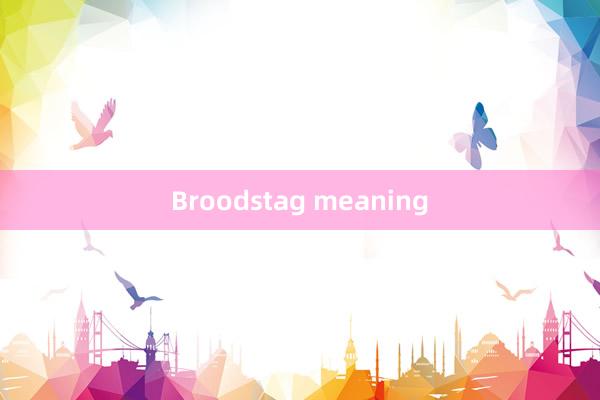
"Broodstag" is an intriguing term that has garnered curiosity in various online communities. While it may not be widely recognized or used in everyday language, its meaning can be interpreted through a combination of linguistic roots and contextual usage. In this article, we will explore the possible meanings of "Broodstag," break down its components, and examine how it can be understood within different frameworks.
The term "Broodstag" can be broken down into two distinct parts: "brood" and "stag."
The word "brood" is commonly used in English to refer to a group of offspring, particularly in animals like birds. When we talk about a "brood," we're usually referring to a family of young animals that are being cared for by a parent. However, "brood" also carries a deeper meaning in a figurative sense. As a verb, "to brood" means to dwell on something, often in a moody or contemplative way. People who are brooding tend to be deep in thought, sometimes over something troubling or significant.
"Stag," on the other hand, has multiple meanings depending on the context. In its most literal sense, a "stag" is a male deer, often associated with strength, independence, and majesty in various cultural representations. In social terms, however, "stag" is used to refer to a man attending an event alone, particularly a party or gathering. The phrase "going stag" is commonly heard when someone attends an event without a partner, often used in the context of weddings or social dances.
With the definitions of "brood" and "stag" in mind, "Broodstag" could take on several interpretations depending on how the word is used. Below are a few potential meanings:
Given that "brood" can refer to deep or thoughtful contemplation and "stag" refers to an individual who is alone, "Broodstag" might describe someone who is deeply reflective and tends to be solitary. This interpretation paints the picture of a person who spends time alone, thinking over issues or emotions,phim set trong rừng possibly even ruminating in a melancholic or introspective way.
This type of individual may prefer solitude to social gatherings, gg777 choosing to engage with their own thoughts rather than with others. The term "Broodstag" could be used to label someone who is self-reflective and enjoys their own company, phim sex lon đep yet is often seen as withdrawn or detached from others.
Another interpretation stems from the idea of a "brood" as a group of young ones, and "stag" as a strong, independent figure. In this sense, "Broodstag" might refer to a protector or leader who watches over and cares for a group. This could be a parent figure, or perhaps a mentor or leader, someone who is responsible for guiding or protecting others.
In this context, "Broodstag" might be used metaphorically to describe someone who has taken on the responsibility of looking after others while maintaining their independence and strength. It reflects a nurturing role combined with the idea of solitary strength, blending care with independence.
In many cultures, the stag is seen as a symbol of power, independence, and natural beauty. In mythology, stags are often linked to gods or spirits associated with the forest and wildness. Meanwhile, brooding characters are frequently portrayed in literature and media as thoughtful, mysterious, or even conflicted.
The term "Broodstag" could evoke images of such characters—lone figures in nature who are thoughtful protectors of the wild. This could apply to characters in fantasy literature, or even real individuals who are seen as connected to nature, standing apart from society while holding a strong protective instinct. In this sense, "Broodstag" might represent a deeper, more symbolic concept, one tied to solitude, wisdom, and nature.
While "Broodstag" is not a widely recognized term, its usage can vary depending on the context in which it is applied. For instance, it could be used to describe someone in a particular emotional state or as part of a narrative in storytelling. Its meaning can be flexible, adapting to different situations.
Writers might use "Broodstag" to describe a character who embodies traits of introspection, loneliness, and strength. For example, a hero who ventures alone into the wilderness to protect their village could be called a "Broodstag" due to their solitary nature and protective role.
In more casual, modern usage, "Broodstag" could become a colloquial way to describe someone who prefers solitude and introspection, yet also takes on responsibilities. Someone who often skips social events but is a dependable, thoughtful friend might be described this way.
The term "Broodstag," though not widely known, has rich potential for interpretation. Combining the meanings of "brood" and "stag," it could refer to someone who is introspective, solitary, or even a protective figure. Whether used to describe a thoughtful individual or a character in a story, "Broodstag" blends the concepts of contemplation, independence, and care into a single, evocative term. As language continues to evolve, new meanings and usages for such terms may emerge, giving us even more ways to express complex ideas and emotions.
188 JILICC login Appwww.nhinteractive.com